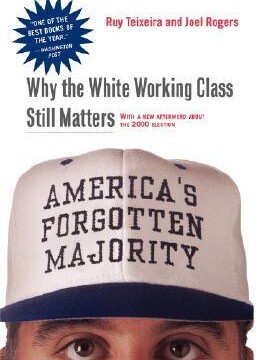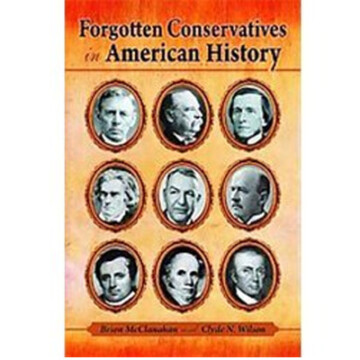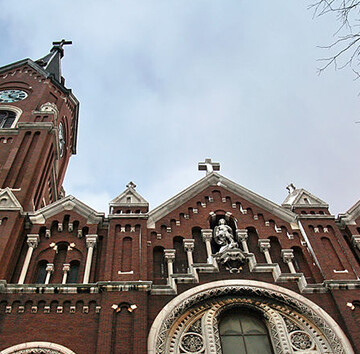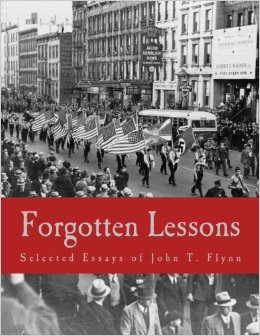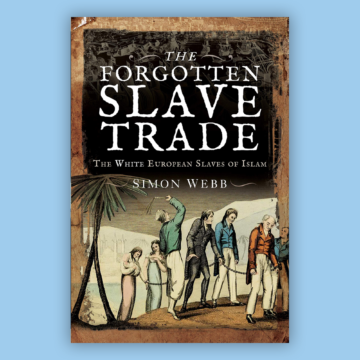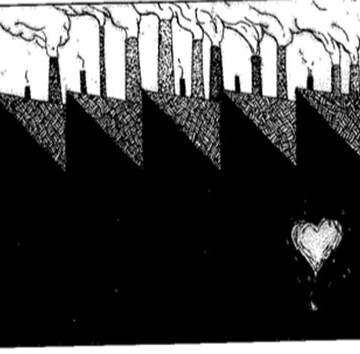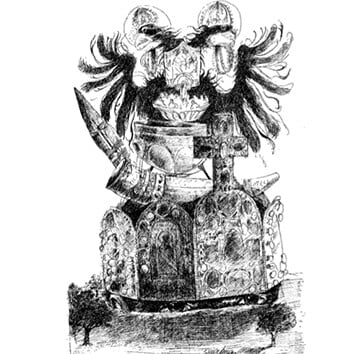Since the 1960’s, American politics at the national level has primarily consisted of an endless search for a new majority. The Democratic Party’s embrace of the civil-rights movement kicked off the quest by undermining the New Deal coalition that combined white Southerners with white, ethnic, Northern union members, allowing the Republican Party to invade the...
1128 search results for: Forgotten%2525252BHistory
Forgotten Corners
Minnesota celebrated its 150th birthday in 2008. This occasion drove news reporter Boyd Huppert from KARE–TV in Minneapolis to travel to the corners of the state for a four-part feature series. In the far northwest corner sits Kittson County, bordered by North Dakota and Manitoba. (Winnipeg is about an hour-and-a-half drive.) The landscape is flat...
A Republic Not Kept
This book might have been called “Forgotten Figures in Real American History”—a social and intellectual reality, tradition, and political-economic program whose life ended, effectively, in 1861, though many dedicated public and literary men (including most of the contributors to this journal) have devoted—or rather sacrificed—themselves to resuscitating it, or at least to keeping its memory...
Exterminating Fantasies
“[Socialism is] the combination of religious sentimentality, industrial insanity, and moral obliquity.” —F.J.C. Heamshaw Some years ago, George Watson wrote two remarkable articles for Chronicles describing how the Soviets, those heroes of socialist resistance to fascism, carried on using German concentration camps for their original purposes until the early 50’s (“Buchenwald’s...
Selective Amnesia
Selective pernicious amnesia is the endemic disease of Establishment politics. Its symptoms are evident whenever the Soviet Union does something awful—like delivering six sophisticated Su-24D bombers to Libya, as it did in March 1988, or excusing the sinking of an advanced Soviet attack submarine in the Norwegian Sea last April, a submarine that, the Soviet...
Forgotten Voices: How Buchenwald Lived On
When I visited Buchenwald concentration camp, near Weimar, in 1988, in what turned out to be the last year of German partition, the Soviet Union’s use of the camp for five years after World War II was hardly to be spoken of inside what, with memorable irony, was still called the German Democratic Republic; my...
Shadows of Forgotten Ancestors (1964)
The Soviet Union in 1964 was about the last place on earth where anyone could find respect for traditional ways and reverence for ancestors. For the most part, the thuggish bureaucracy controlling that unlamented establishment exuded an almost eager desire for drabness that was downright studied in its gleeful love ...
James Branch Cabell
In a 1956 essay, Edmund Wilson wrote: “Cabell is out of fashion.” Withdrawing his dismissal of James Branch Cabell, Wilson gave him a critical accolade—and his generosity was praiseworthy. For by 1956, Cabell was not only out of fashion but virtually forgotten, though he was not alone in this. Most of his contemporaries, more or...
John O’Hara and American Conservatism
In 1941, Edmund Wilson published a small book of pieces about several contemporary writers, tied together under the tide, The Boys in the Back Room. It was a typical Wilsonian production—insightful, wrongheaded, and regal—synthesizing as “Hollywood writers” James M. Cain, William Saroyan, John Steinbeck, and others now forgotten, along with John O’Hara. That this linkage...
Race, Genocide, and Memory
In 2012, U.S. historian William H. Frederick sparked a fierce controversy about a horrible if largely forgotten episode in Asian history, the so-called Bersiap movement of the 1940’s. The affair demands our attention for what it suggests about the politics of memory, and how we value human lives. It also reminds us of the quite...
‘What Men? What Needs?’
“Rational thought Calm, reasonable, gentle persuasion. It was this quality of moderation in his writing that most impressed me, for my own inclinations always tended toward the opposite, toward the impatient, the radical, the violent.” —Edward Abbey on Joseph Wood Krutch The name of Joseph Wood Krutch was well-known in its day, much less so...
Signs of Hope in the East
In the United States, the forces of the cultural left have been particularly aggressive in seeking to diminish the influence of our Christian heritage on American society. The Obama administration has led the campaign for the complete separation of religion from the public square. It has used executive orders, regulatory rule-making authority, and the bully...
The Romantic Revival
The first thing to say about the Romantic Revival is that the phrase itself is a bit ambiguous, though I haven’t meant to be misleading. Romanticism originally had an aspect of revival of the medieval, as in the Gothic revival and the revival of medieval romance. And the phrase could also denote the return to...
Where Color Led
Yale University Press promises that Witness to History “will fascinate anyone interested in the great political figures of world history during the twentieth century.” On this book’s back cover, Alistair Horne hails John Wheeler-Bennett as “a gifted historian . . . one of the outstanding, though unsung, certainly unrepeatable Britons of his age.” It is...
The Spiritual Meaning of Philosophy
In 525 A.D. the Lady Philosophy reminded Boethius, in his death-cell, that true philosophers must think body, rank, and estate of less importance than their understanding of what was truly their own. This understanding of philosophy, which is also Epictetus’s and Aurelius’s, as something more than a pleasant enough word game, has been neglected by...
Old Progressives Don’t Die
Surprisingly enough, in many ways journalist and commentator John T. Flynn was a typical progressive. Long a figure of prominence on the American right, he was not politically active in the time of Woodrow Wilson, whose domestic policies he much admired. He did, however, first gain prominence as a muckraker denouncing the financial chicanery of...
Boris Nemtsov: How a Living Pawn Became a Dead King, Part II
For now, several suspects from the Caucasus have been arrested. Let us note that all of the political murder victims of recent years—Markelov, Politkovskaya, and Nemtsov have been somehow or other tied to the Caucasus region. Remember, it was Nemtsov who lobbied Denmark not to extradite the Chechen criminal Ahmed Zakayev. Later he cowardly denied...
The Five Good Reasons
Atheists have no god to worship. This is by no means a tautology. Belief in god is ingrained in our nature, and Anselm’s proof is the nearest thing to an effective rebuttal of atheism. Put in simple terms, Anselm’s argument is that we know that god exists because we have the category god in our...
A Difficult Decade
James Patterson’s controlling idea is that the 60’s became the 60’s in 1965, and that this represented an “Eve of Destruction.” One struggles for about 300 pages trying to find out . . . destruction of what? The title comes from a long-forgotten song by a long-forgotten singer, Barry McGuire. “Eve of Destruction” did get...
Diagnosing the Right as Pathological
While President Joe Biden was supposed to turn down the temperature and restore normalcy to our political life, rhetoric from those in power increasingly echoes with dark references to “homegrown terrorists” and “extremists” emerging from a process of radicalization. For months after the inauguration, the ruling class maintained Washington, D.C. as a fortress city, complete...
Geoffrey Blainey and the Multicultural Nirvana
One’s kindest possible response to the Australian Broadcasting Corporation’s typical attempt at a sitcom is Mark Twain’s quip about The Vicar of Wakefield: “Nothing could be funnier than its pathos, and nothing could be sadder than its humour.” Hence the astonished pleasure inspired by the Corporation’s dazzling new comedy Frontline. A merciless skewering of current-affairs...
The Reagan Coalition
Italy experienced a revolutionary election on March 27, 1994, an election in which many Italian voters could make a difference. This mood of optimism and engagement stood in stark contrast to the many elections that have left Italians so disillusioned in recent years—local administrative elections, national elections to two houses of Parliament, and even international...
American Mojo
“America was, is, and—we pray—will continue to be the place where more than anyplace else, dreams actually do come true” —William J. Bennett The key phrase to notice in William Bennett’s statement is “more than anyplace else.” In recent years, a number of well-meaning patriots have taken up the theme of what is called American...
The Meaning of Decadence
When people speak of a society being “decadent,” they commonly understand decadence in terms of standards of personal behavior and the sense of morality, or want of it, that behavior expresses. For conservatives, personal morality begins with sexual morality grounded in revealed religion; for liberals, with what they call an “ethical” approach to human relations...
Gnawing Away at Vidal
We do not live in a golden age for homegrown and corn-fed radical critics. Legal restrictions on political speech remain few, but informal strictures and the passage of time have muted those who remember—and like—the free, landed republic that this country used to be, before World War II and the monolithic Cold War state that...
Judicial Taxation Without Representation
There is an unattributed quotation that says, “The average taxpayer is the first of America’s natural resources to be exhausted.” The American people have turned away from a big, activist federal government because they feel they have been forgotten; in fact, taxpayer resources have long been exhausted. Today, average Americans, forgotten by the bloated bureaucratic...
THE PARTY STATE
In Washington, D.C., access and influence go hand-in-hand; they are the stock and trade of the lobbyist, the lawyer, and the political advisor. They are, as well, the biggest “skill” current officeholders and staff members can take with them when they leave the government. —from Pat Choate, “Puppets for Nippon,” May...
Signs of the Sandinistas
The mural is old and faded, a reminder of headier days when the world looked ripe for violent revolution. Three years of neglect, the effects of a tropical climate, and petty vandalism have combined to give the mural its present appearance of a long-forgotten billboard along some abandoned stretch of rural highway. Yet the huge...
The Fighting Marine: Gene Tunney
Though he beat Jack Dempsey decisively the two times they met in the ring, was undefeated as a heavyweight, and retired as heavyweight champion, Gene Tunney is often forgotten when today’s era of fight fans or others discuss the greatest heavyweights. Political correctness doesn’t allow us to forget black champions such as Jack Johnson, although...
Forgotten Fighters
I was pleasantly surprised to see an article about a boxer in Chronicles. Roger D. McGrath’s “The Fighting Marine: Gene Tunney” (Sins of Omission, January) describes a great champion and an admirable American who should be better remembered. Dr. McGrath alludes to Tunney’s fights with Harry Greb, a five-fight series that is also unfortunately forgotten. ...
Books in Brief: The Forgotten Slave Trade
The Forgotten Slave Trade: The White European Slaves of Islam, by Simon Webb (Pen and Sword History; 208 pp., $39.95). In America, public discussion about slavery—when it doesn’t devolve into BLM activists burning cities or congressmen bending the knee—is premised on important but erroneous assumptions: only blacks have been enslaved; black slavery was racially motivated; discussion...
Trump: America for the Americans!
As the patriotic pageantry of Inauguration Day gave way to the demonstrations of defiance Saturday, our new America came into view. We are two nations now, two peoples. Though bracing, President Trump’s inaugural address was rooted in cold truths, as he dispensed with the customary idealism of inaugurals that are forgotten within a fortnight of...
The Bush Legacy
Does anyone really remember what sort of president Bill Clinton was? Have we all forgotten his amazingly sordid character so soon? He disgraced the Oval Office like no president before him; he was only the second to be impeached; he embarrassed America before the world; known as Slick Willie in his native Arkansas, he almost...
Land of Obama
“A corrupt society has many laws,” observed the Roman historian Tacitus. The Founding Fathers knew this aphorism, and their work reflects it, from the Articles of Confederation to the Federalist to the Tenth Amendment. They designed these documents to save this country from the plague of “many laws.” And the inaugural addresses of nearly all...
Let’s Cheat on Our Taxes
As I write, April 15 is still fresh in the mind, and the sting of death remains, combining the current pangs of tax extraction with the promise of a greater burden to come, thanks to the Barackification of heathcare. So imagine my delight when I read in a back issue of ...
The Fall of Lord Blackadder and Lady Manolo (of Blahnik)
Mark Steyn once told me a revealing story about Conrad Black’s “conservative” Canadian national newspaper, the National Post. It seems star columnist David Frum had ventured this evaluation: “The Post has a problem. It was started to save Canada, but Canada isn’t worth saving.” Ah, the authentic voice of the Canadian neoconservative! Or, as English...
Credulous Creatures
“If the world will be gulled, let it be gulled.” —Robert Burton Who now reads Alfred Kinsey? Almost no one. Who now remembers the great media event set off in 1948 by the publication of his “monumental” book of 804 pages on Sexual Behavior in the Human Male? Most Americans over 40 probably do, while...
ICC Rising
It was a sad day for conservatives when, on December 5, 2011, Laurent Gbagbo rose to speak in the antiseptic courtroom of the International Criminal Court. Polite, old-fashioned (if a little verbose), well-dressed (but obviously not very well), the 66-year-old former president of Ivory Coast was clearly upset to find himself a prisoner, having been...
It’s Hard Times, Cotton Mill Girls
Historians tend to make the same argument: The South lost the Civil War because its economy was agrarian rather than industrial, with too few munitions factories to supply Confederate troops with weapons and too few textile mills to clothe them. According to these same historians, the postbellum sharecropper system proved to be an economic disaster,...
Foss’s Flying Circus
In the early 1960’s, I was introduced to a fellow motorcycle rider by the name of Steve Foss. Before I could say anything, he quickly offered, “No relation to Joe Foss.” He had anticipated my question and that of nearly everyone he had met for years back. For most Americans back then, the name Foss...
It’s Hard Times, Cotton Mill Girls
Historians tend to make the same argument: The South lost the Civil War because its economy was agrarian rather than industrial, with too few munitions factories to supply Confederate troops with weapons and too few textile mills to clothe them. According to these same historians, the postbellum sharecropper system proved to be an economic disaster,...
Noche de Desastre
The morning after meeting Juanito Villalobos, Héctor, throwing Dr. Spock’s strictures to the wind, put his foot down when Dubya demanded to be taken to the Lion Habitat immediately after the family’s return from breakfast at McDonald’s. His patience was suddenly at an end. Although the Habitat itself was free, the Villas’ suite by now...
Downsizing Detroit Motown’s Lament
Detroiters have a deeply ironic way of looking at their beloved city. The irony is evident in a once-popular T-shirt that showed a muscular tough gripping a ferocious dog around the neck while holding a loaded gun to the animal’s head. “Say Nice Things About Detroit,” the T-shirt read. The T-shirt is a commentary on...
Beyond the “Other Victorians”
To call something “Victorian” is, in left-liberal parlance, to say that you don’t like it. The fact that hardly anything routinely called “Victorian” accurately characterizes the era of Queen Victoria’s long reign, from 1837 to 1901, is one of the great historiographical tragedies of the 20th century. Thus, when a large number of African bishops...
Letter From Texas: Gott Mit Uns
As modern imperialism grows, even the regions within those countries under its rule become homogenized. Within the subnational regions, smaller ethnic enclaves, with their diverse cultures, tend to take one of two paths. They become tourist traps where the natives are ...
The Empire At Europe’s End
In the German name for Austria, Osterreich, Reich denotes more than “empire” in the sense of territorial extension; there is also a certain spiritual content. In the Middle Ages, empire meant the Eastern Roman Empire of Byzantium, and after Christmas Day 800, when Charlemagne was crowned by Pope Leo XIII, the Sacer Imperator Romanus was...
Borderlines, Part 2
Tanks make good pictures—the idea of an invasion of Ukraine sends shivers down the spines of most of Europe—and keeping the tanks at bay is what the political class is expected, indeed offers, to do. The price, however, will be for nations to surrender just about everything else. And that price is now about to...
Donald Davidson and the Calculus of Memory
The opening scene of the folk opera Singin’ Billy, for which Donald Davidson wrote the book and lyrics, takes place in the yard of Callie Wilkins, “Miss Callie,” the matriarch of Oconee Town in Pickens County, South Carolina. Two young people have married, John and Jennie Alsop, and are in danger of a shivaree. They...
Literature and the Curriculum
The controversy over the humanities curricula is a struggle over definition, and what is at issue is not so much the nature or purposes of the American university as the identity of the American people. There have been many such definitional combats in the past; the greatest of them led to the War Between the States....
Recapturing the Constitution
In a landmark five-to-four decision last spring, in United States v. Lopez, the Supreme Court announced—for the first time in almost 50 years—that Congress had exceeded its interstate commerce powers. At issue was a federal statute—the Gun Free School Zones Act of 1990—which forbade the carrying of firearms within one thousand feet of a school....
